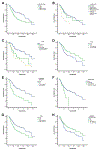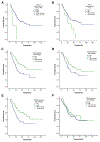Surgical Resection of SCLC: Prognostic Factors and the Tumor Microenvironment
- PMID: 30735815
- PMCID: PMC6510981
- DOI: 10.1016/j.jtho.2019.01.019
Surgical Resection of SCLC: Prognostic Factors and the Tumor Microenvironment
Abstract
Introduction: Surgery in SCLC is limited to very early stages, but several reports suggest a potential broader role. Little is known of the influence of microenvironment on the biology of SCLC.
Methods: We assessed the clinical prognostic factors in a large series of resected SCLC patients. The prognostic value of programmed cell death ligand 1 (PD-L1) expression in tumor cells and tumor infiltrating lymphocytes (TILs) and the percentage of CD3-, CD20-, CD45- and CD68-positive cells, were also investigated.
Results: Two hundred five SCLC cases were resected between 2005 and 2015 and the median follow-up was 29 months (range: 2 to 135 months). Median survival of all patients was 69 months, and 5-year survival rates were 63.8%, 65.5%, 34.9%, and 0% for pathologic stages I, II, III, and IV, respectively. By multivariate analysis complete resection, cigarette index, lymph node metastatic rate, percentage of CD3-positive cells, PD-L1 expression in tumor cells, and TILs were independent prognostic factors. High PD-L1 expression was present in 3.2% and 33.5% of all tumor samples in tumor cells and TILs, respectively. High PD-L1 expression in tumor cells or TILs correlated with shorter survival, whereas high expression of CD3, CD20, and CD45 correlated with better survival.
Conclusions: Resected stage II SCLC patients have similar survival as stage I, suggesting that surgery could be extended to patients with hilar lymph node involvement. Survival was better in tumors with a higher percentage of T cells and B cells, whereas PD-L1 expression in tumor cells and TILs correlated with worse survival, which suggests a potential role of immunotherapy in resected SCLC.
Keywords: Prognosis; Programmed death ligand 1; Ratio of metastatic lymph nodes; SCLC; Surgery.
Copyright © 2019 International Association for the Study of Lung Cancer. Published by Elsevier Inc. All rights reserved.
Conflict of interest statement
All authors report no conflict of interest
Figures



Comment in
-
Immune Cell Infiltration Is a Strong Prognostic Indicator in Surgical Resection of SCLC.J Thorac Oncol. 2019 Oct;14(10):e242-e243. doi: 10.1016/j.jtho.2019.06.029. J Thorac Oncol. 2019. PMID: 31558242 No abstract available.
-
Author's Reply.J Thorac Oncol. 2019 Oct;14(10):e243-e244. doi: 10.1016/j.jtho.2019.06.030. J Thorac Oncol. 2019. PMID: 31558243 No abstract available.
References
-
- Chen W, Zheng R, Baade PD, et al. Cancer statistics in China, 2015. CA: a cancer journal for clinicians 2016;66:115–132. - PubMed
-
- van Meerbeeck JP, Fennell DA, De Ruysscher DK. Small-cell lung cancer. Lancet (London, England) 2011;378:1741–1755. - PubMed
-
- Rudin CM, Ismaila N, Hann CL, et al. Treatment of Small-Cell Lung Cancer: American Society of Clinical Oncology Endorsement of the American College of Chest Physicians Guideline. Journal of clinical oncology : official journal of the American Society of Clinical Oncology 2015;33:4106–4111. - PubMed
-
- Fruh M, De Ruysscher D, Popat S, et al. Small-cell lung cancer (SCLC): ESMO Clinical Practice Guidelines for diagnosis, treatment and follow-up. Annals of oncology : official journal of the European Society for Medical Oncology 2013;24 Suppl 6:vi99–105. - PubMed
Publication types
MeSH terms
Grants and funding
LinkOut - more resources
Full Text Sources
Other Literature Sources
Medical
Research Materials
Miscellaneous

